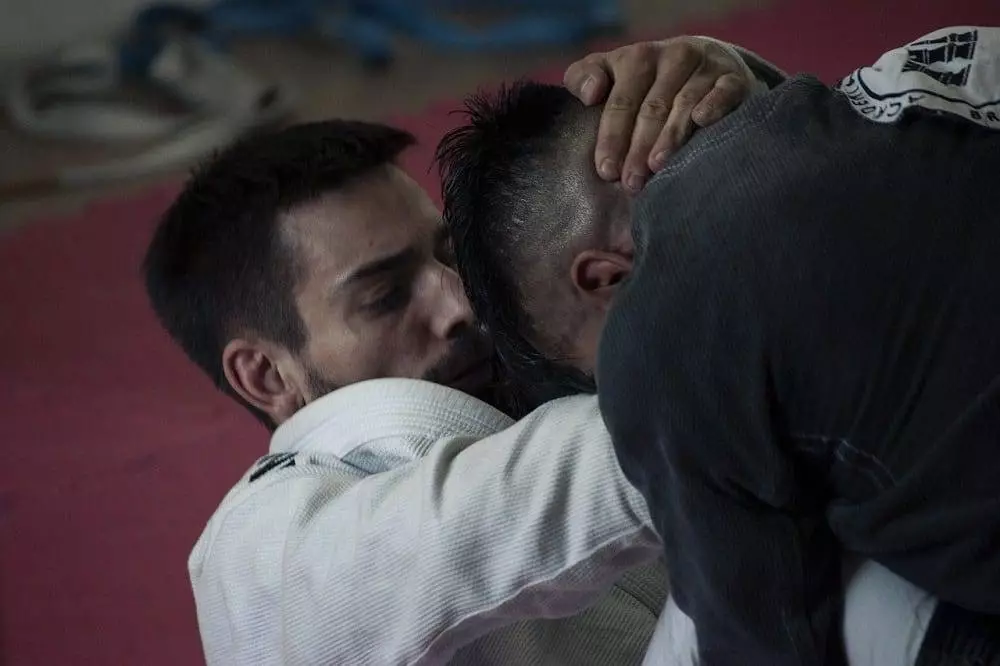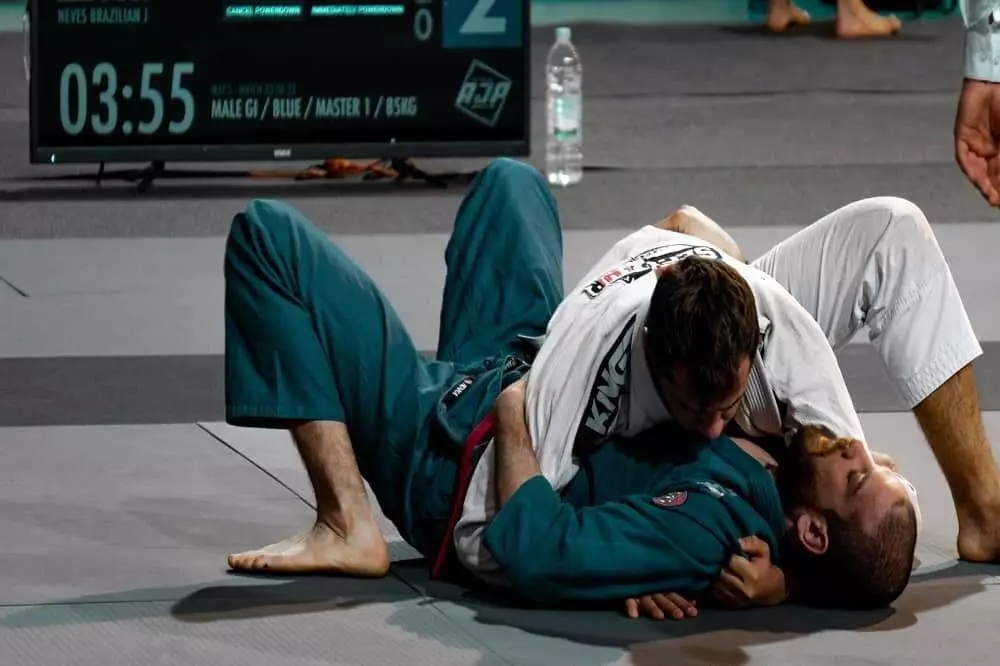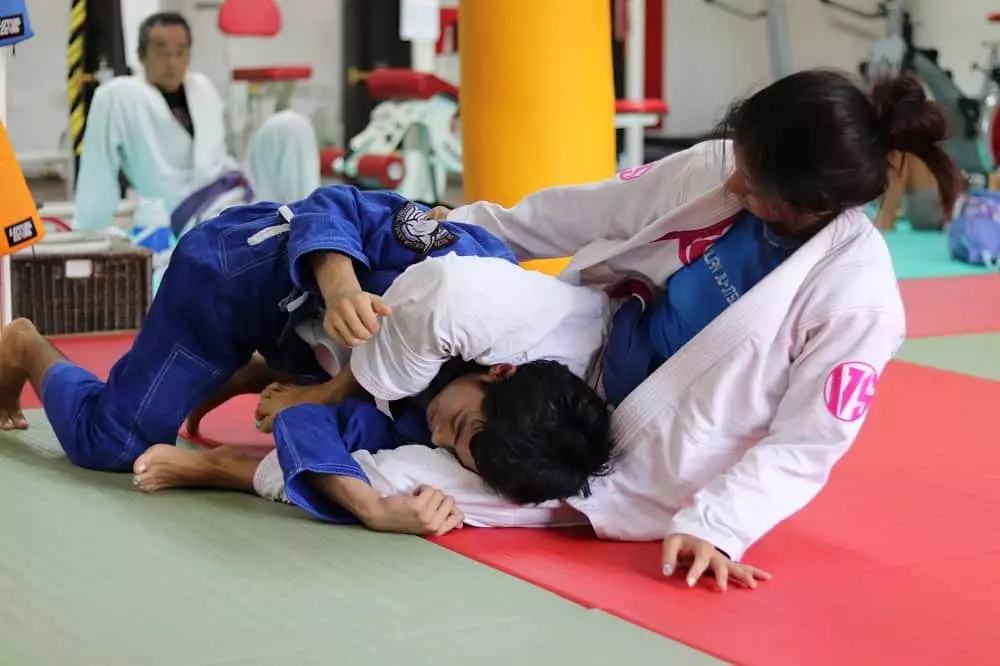Although the reasons to train BJJ go far beyond fighting, I’m willing to bet that training BJJ for self defense was a primary factor in your choosing BJJ over other activities or arts. While few would claim BJJ is ‘all you need’ for self defense, it is certainly the core of an effective real-world self defense system.
As a system, BJJ addresses some of the worst scenarios that can happen to you in a fight. It is also incredibly effective at subduing and defeating an opponent in a physical struggle. BJJ has even played a role on modern battlefields.

As with any system, there are pros and cons to BJJ for self defense. Whilst BJJ for self defense does have its weaknesses, the cons of BJJ are largely mindset issues, rather than flaws in the techniques themselves.
Here is a list of some of the pros and cons of BJJ for self defense and some advice on how to gear your training for real-world scenarios.
Table of Contents
Pros of BJJ for Self Defense
#1 – Addresses worst case scenarios
The full spectrum of self defense goes far beyond individual techniques or even a single martial art. Nevertheless, the fundamentals of BJJ represent a crucial set of self defense techniques, for some of the worst positions you might find yourself in during a fight.
Everyone knows by now that ‘you never want to be on the ground in a street fight,’ the question remains – what happens if you end up there anyways?
There are an infinite number of real-life situations where you might end up mounted despite your best efforts.
Maybe you end up like this poor gentleman: flattened on your stomach, getting wailed on by a furious corn-fed good ol’ boy. Notice how it’s almost a toss-up when the big guy gets on top.
Personally, I never want to trust my survival to the goodwill of someone who’s already on top of me raining punches.
The fact is that if you don’t have an escape sequence to work back from having someone on top of you pummelling your face in, it’s basically game over if someone has even an inkling of instinct as far as staying on top goes.
Many of the old school masters, such as Saulo Ribeiro espouse that survival and escape from the losing bottom positions were the foundation of jiu jitsu, and should be the first focus of training BJJ for self defense.
In fact, Helio Gracie’s system was built around survival. As such, everyone training for self defense should have a good grasp of the fundamentals.
#2 – BJJ techniques are very effective for self defense
Most ordinary people are sold on the effectiveness of BJJ by rolling with someone blue belt or above. Furthermore, watching any UFC card should prove that in a fight with someone skilled in hand-to-hand combat, you need to have a strong working knowledge of the ground.
But what about actual combat?
While the majority of war is fought with bombs and guns, many military personnel still train jiu jitsu, and for good reason. If a soldier is caught is in a hand-to-hand scenario with the enemy and is unable to use their normal weapons, they must still be able to overcome the enemy.
For example, Australian commando Paul Cale was in close quarters with a Taliban fighter while serving in Afghanistan.
Unable to fire his weapon because the enemy was wrestling with his fellow commando, Cale arm-barred and choked out the Taliban fighter. The fighter was taken into custody alive.

#3 – BJJ is less damaging to learn than other arts
Although BJJ is far harder on the body than sports such as golf or frisbee, compared to a combat art such as Muay Thai or Lethwei, BJJ is actually pretty gentle.
While striking arts can be extremely effective for winning fights, skill with fists, legs, and knees comes at a pretty steep cost.
It is virtually impossible to develop any skill with striking without a good amount of time spent live sparring.
Throughout this sparring, you will be getting hit. Its inevitable. The more we learn about the brain, the more people have begun to realize that even the minor subconccussive hits can lead to serious consequences down the line.
Don’t get wrong, I do recommend training some striking as well as BJJ for self defense, but there is a point of diminishing returns as far as getting better at striking goes. As someone who’s had several concussions as well as many minor ‘bell rings,’ I don’t believe that it is wise to spar often in striking unless you actually plan to compete.
On the other hand, you can keep training BJJ pretty much as hard as you want without risking brain damage. There is always room to grow your game and have fun in BJJ while staying sharp enough to defend yourself in a bad situation. Avoiding the long term brain damage associated with regular striking sparring makes BJJ a better long term self-defense solution.
#4 – BJJ allows full use of the force continuum
Unlike training a striking art, BJJ for self defense allows you to control your opponent with varying levels of force. You can pin your drunken uncle at the family reunion until he calms down, but you can also break the arms and legs of someone assaulting you in a nightclub bathroom.
The control associated with good jiu jitsu ultimately makes it more versatile than striking or lethal weapons for general self defense.
It looks a lot better afterwards if you can say you took down and controlled the drunken guy who swung on you, rather than that you gunned some guy down who you now have to prove was threatening your life.

#5 – BJJ techniques can be consistently applied on larger opponents
Although we all like to say that technique beats strength, the fact remains that even a very high level 140 pound striker has the odds stacked against him when faced with a guy twice his size. If the big guy grabs him… it could get rough.
On the other hand, a 140 good blackbelt can probably mop the floor with even a purple belt twice his size. The purple belt against a white belt? No chance. Grabbing a good grappler if you aren’t trained to grapple is generally a risky move.
Consider this: if you had to train a 120 pound woman to get away from a 200 pound man on top of her, what would you show her? A one-two leg kick or a hip escape and technical stand up?
The Cons of BJJ for Self Defense
Although BJJ fundamentals are vital for self defense, there is no denying that BJJ does have a few holes in terms of self defense.
Standard BJJ curriculums are not going to include much striking training, and may or may not include wrestling or takedown work. Without basic striking and wrestling, BJJ will primarily only be good for getting out from bottom and maybe submitting. If you can’t impose a takedown on your attacker, you will not have an offensive self defense skill set.
Furthermore, few BJJ instructors are qualified or inclined to teach civilians weapons based techniques such as deploying firearms or knives in a clinch or ground scenario.
However, the main issue that goes beyond striking or weapons in BJJ for self defense is the mindset.
Most modern instructors do not talk about this mindset when teaching BJJ. At best, the coach will have MMA experience and be able to talk from that perspective.
Unless you instructor was is military or law enforcement, he probably hasn’t really used his skills in a ton of life and death, non-competition scenarios.
As pointed by Sgt Rory Miller, it is hard to find an instructor who has actually survived enough real-world violence to say anything about it, much less give advice that has any statistical significance.
This isn’t the end of the world, but it means that you will have to work on your own mindset when doing BJJ for self defense. Consider what the technique would look like if performed on asphalt or in the middle of a rioting crowd. Can the attacker hit you, claw you, or bite you from the common positions you put people in when rolling live?
Final Thoughts
Whilst BJJ cannot encompass every combat or self defense scenario, there is no denying the the foundational BJJ techniques are all needed for a well-rounded self defense game.
If you, as the student can apply a defensive mindset to your training, and read and learn from those with law enforcement and military experience, training BJJ for self defense is a wise plan. And if you are still not convinced, here is the article where we discuss in detail why BJJ is good for self defense.